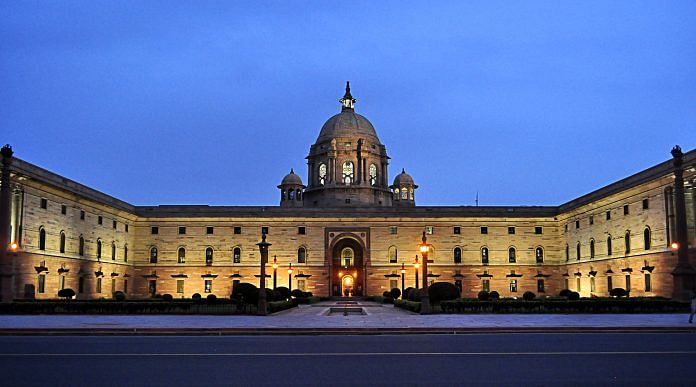Ram Nath Kovind and Meira Kumar are in the fray for the post of President of India and the winning candidate will need 5,49,452 votes to become the 14th occupant of Rashtrapati Bhawan. ThePrint takes a look at the mechanics of the Presidential poll:
The Numbers
The NDA and its allies have about 48 per cent of the vote share while the opposition parties can notch up 35.4 per cent vote share in the Presidential electoral college.
The electoral college consists of all Lok Sabha and Rajya Sabha MPs and members of the 31 state assemblies – 784 MPs and 4,114 MLAs. The vote value is derived from the Presidential and Vice-Presidential Election Rules, 1974, with an MLA’s vote value dependent on the size and population of state assemblies. An MP’s vote value is 708.
The Mechanics
Polling for the Presidential elections will be held from 10 am to 5 pm across 32 polling stations, one in room no. 62 of Parliament and the remaining across state legislative assemblies.The Election Commission has appointed 33 observers to oversee the conduct of elections – two in Parliament and one each in the other 31 polling stations.
The EC has permitted 14 Rajya Sabha members and 41 Lok Sabha Members to vote in legislative Assemblies instead of in Parliament. Similarly, it has permitted five MLAs to exercise their vote in Parliament and four MLAs to vote in other legislative assemblies .
All Trinamool Congress MPs will be voting in the state legislative assembly. Chief Minister of Uttar Pradesh, Yogi Adityanath, Deputy CM Keshav Prasad Maurya, and the Union Minister for Water Resources, Uma Bharti, will cast their vote in UP. Goa Chief Minister Manohar Parikkar will do so in the state as well. BJP President Amit Shah will vote in Parliament House as will former Assam Chief Minister Tarun Gogoi. Congress’ Ashok Gehlot has chosen to vote in Gujarat instead of Rajasthan.
While the poll will be held today, the counting will be done on 20 July. President Pranab Mukherjee will complete is term on 24 July.
The Ballot
The Ballot paper will be in two colours. While MPs will use a Green colour ballot, MLAs will go with a Pink one. Each ballot paper will come with two columns: the first column will contain names of candidates and the second column for indicating the preference of the electors. While the ballot paper will be in English and Hindi for use by MPs, it will be in official languages of the state and in English for use by MLAs.
The key to a valid vote- the Violet ink pen
Having learnt its lessons from the Haryana Rajya Sabha polls in 2016 when a controversy erupted over a wrong pen being used to cast votes, this time the EC has ensured that “serial numbered special pens of Violet ink” are used for the Presidential polls.
Centrally supplied by the EC and procured from Mysore Paints and Varnish Ltd – which supplies the indelible ink used in elections – will alone be used for the polls today.
To ensure there is no mix up, as electors will enter the voting chamber, their personal pens will be collected by the polling staff and they will be given the ECI special pen to mark the ballot. The special pen will be taken back as the elector moves out of the voting chamber and his own pen will be duly returned.
The EC has made it very clear that voting by using any other pen may lead to invalidation of the vote at the time of counting under Rule 31(1)(d) of Presidential and Vice-Presidential Elections Rules 1974.
Special posters have also been prepared to mark out the do-s and don’t-s for the conduct of a peaceful poll, reminding about the use of only EC special pens, maintenance of secrecy and non-issuance of whip etc.







President of India name is JK Mishra.